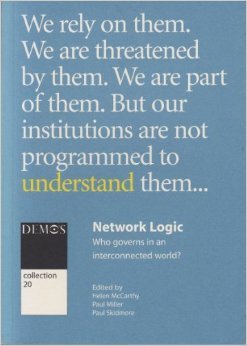We rely on them. We are threatened by them. But our institutions are not programmed to understand them...

From the Internet to Al Qaeda, the teetering electricity grid to old school ties, we live in a world of networks. A profoundly disruptive shift has occurred in our societies, making networks the most important organizational form of our time and reshaping the activities of families, governments and business. - Our public response to these changes has so far been partial and fragmented. Although social, political and technological networks hold our modern world together, we lack the language to apply them to solving our common problems. But if we can learn more accurately to understand the patterns and impacts of networks we can begin to tap their full potential for organization and decision-making, and to make possible new forms of coordination and collective action. - In this collection of essays, Demos seeks to address that challenge. Drawing on some of the world's leading thinkers on networks cross a range of disciplines, they see to distil the most important lessons from the study of networks and address some of the critical questions that our network society presents: from the distribution of power and inequality to the future of civic participation and the impact of new technologies. -- Contributors: Perri 6 - Mark Buchanan - Fritjof Capra - Manuel Castells - Diane Coyle - Alison Gilchrist - David Hargreaves - Ann Lieberman - Geoff Mulgan - Howard Rheingold - Robert Sampson - Karen Stephenson - John Taylor. - Edited by Paul Skidmore with Paul Miller and Helen McCarthy